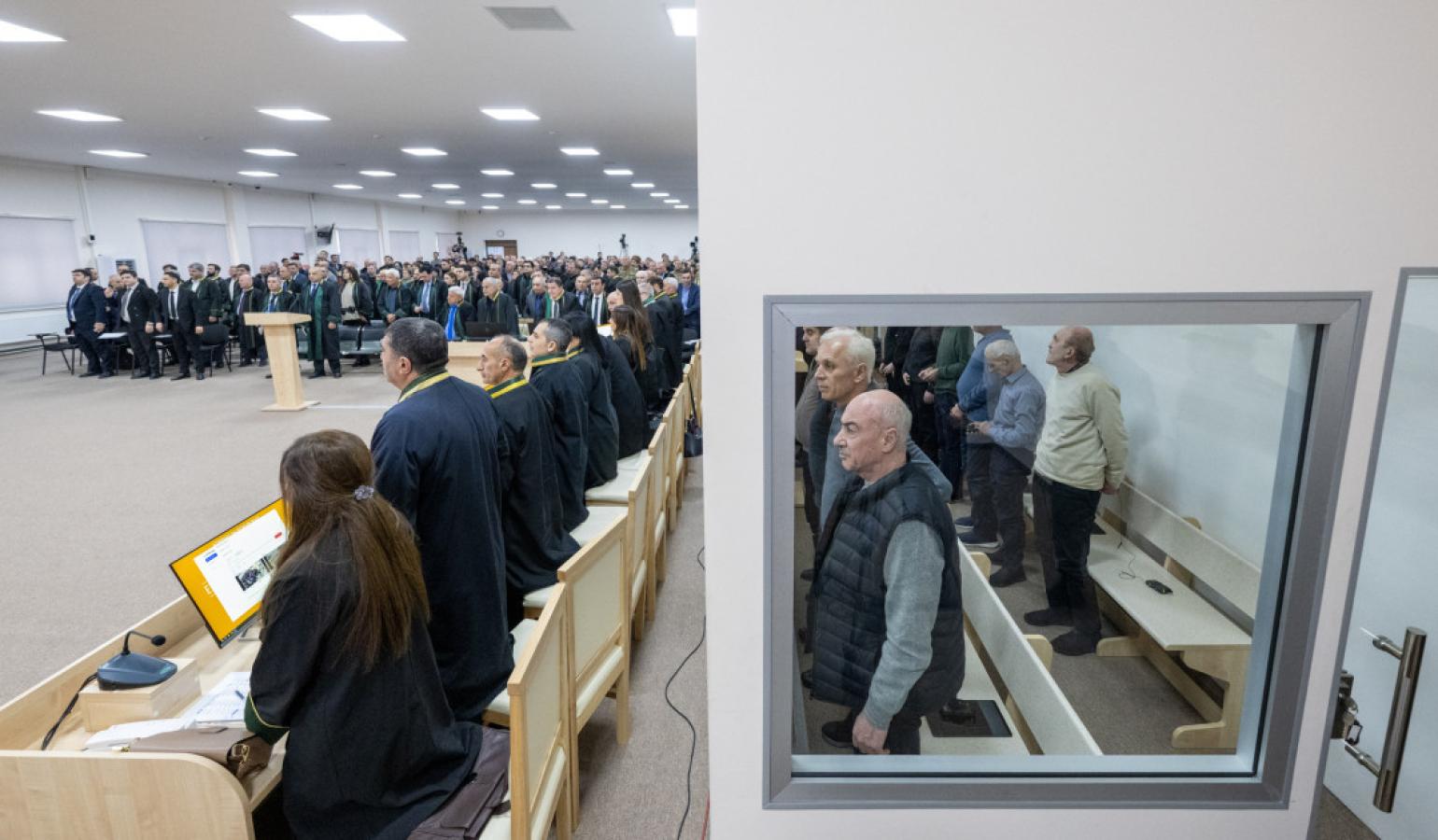
The trials of the former military and political leadership of Artsakh continue in Baku. On February 18, a hearing was held in the case of Arayik Harutyunyan, along with other former officials and military personnel. The session was closed to the public, with only Azerbaijani state media present.
The Azerbaijani state news agency AzerTac reports that “each defendant has been provided with a translator in their preferred language, as well as legal counsel.” Public prosecutors Fuad Musaev and Vusal Abdullayev read sections of the indictment related to alleged “individual criminal acts committed during the war and the defendant’s role in those crimes.”
AzerTac also reports that presiding judge Zeynal Aghayev explained to Arayik Harutyunyan and Arkadi Ghukasyan the nature of each charge brought against them, the legal classification of their alleged actions, the penalties prescribed by the criminal code for those actions, and their rights as defendants. He also asked whether they pleaded guilty.
Arkadi Ghukasyan and Arayik Harutyunyan addressed the court, requesting a private meeting with their legal counsel before responding to questions. The next hearing is scheduled for February 20, during which the court will continue presenting details on the charges and prescribed penalties for each of the other detainees involved in the case, as well as clarifying their stance on the charges brought against them.
“The charges brought against Armenian prisoners of war, as well as their ongoing revisions, are fabricated. This is not a trial but a persecution against Armenians. In these trials, we see courts conducting imitation processes, mere formalities of prosecution rather than justice,” said human rights defender Siranush Sahakyan, head of the Center for International and Comparative law, in an interview with Azatutyun radio.
At the February 18 hearing, Ruben Vardanyan submitted a motion requesting a private meeting with his lawyer, which the court granted. After the recess, they filed a motion for the judge’s recusal, but the court refused to consider it.
“Even before the first hearing, the former State Minister of Artsakh had alerted, through his family, about Baku’s pressure and the fabricated charges against him. He refused the public defender provided by Azerbaijan and is the only Armenian prisoner with a private lawyer. While this may formally set him apart from public defenders, it does not mean that Vardanyan’s right to a fair trial is guaranteed,” said Siranush Sahakyan.
According to the human rights defender, if private lawyers act too independently and boldly, they risk losing their ability to practice law due to state repression. “There have been cases where even criminal prosecutions have been initiated,” she noted.
Ruben Vardanyan moved to Artsakh two years after the 44-Day War and served in office for only three months. He did not participate in military or wartime actions, either in Artsakh or Armenia, yet he is accused of war crimes. Like other detainees, his case includes serious charges that also implicate Armenia.
“These individuals are symbolic targets and are subjected to personal revenge. However, Azerbaijan’s ultimate goal is to prosecute and condemn the right to self-determination of Artsakh,” said Sahakyan.
The human rights defender emphasized that by involving Armenia in these cases, Azerbaijan aims to shut down the issue of Artsakh’s self-determination in international courts. Through verdicts against Armenians, Azerbaijan seeks to portray Armenia as an aggressor that has ‘occupied Artsakh.’
***
Fifteen Armenian prisoners of war have been charged under the following articles of the Azerbaijani Criminal Code: Article 100 (planning, preparation, or waging aggressive war), Article 102 (attacks on individuals and organizations entitled to international protection), Article 103 (genocide), Article 105 (extermination of populations), Article 106 (slavery), Article 107 (forced displacement or deportation of populations), Article 109 (persecution), Article 110 (forced disappearance of persons), Article 112 (imprisonment contrary to international law), Article 113 (torture), Article 114 (mercenary activity), Article 115 (violation of the laws and customs of war), Article 116 (violation of international humanitarian law during armed conflict), Article 118 (war profiteering), Article 120 (intentional murder), Article 192 (illegal business activities), Article 214 (terrorism), Article 214-1 (financing of terrorism), Article 218 (organization of a criminal community (criminal organization)), Article 228 (illegal acquisition, transportation, sale, possession, transfer, or carrying of weapons, their components, ammunition, explosives, or explosive devices), Article 270-1 (dangerous activities threatening aviation safety), Article 277 (attempted murder of a state or public figure), Article 278 (forcible seizure of power or forcible retention of power, forcible change of the state constitutional order), Article 279 (creation of armed formations or groups), and other related articles.